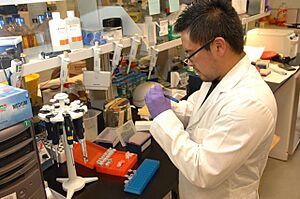Medical laboratory facts for kids
A medical laboratory is a special place where scientists do tests. They look at samples from people, like blood or other body fluids. The main goal is to find out important information about a person's health. This helps doctors understand what might be making someone sick. It also helps them decide the best way to help patients get better.
Contents
What Happens in a Medical Lab?
Medical labs are busy places. Scientists use special tools and machines to study tiny parts of samples. They might look for signs of infection or check how well organs are working. These tests give doctors clues about a patient's condition.
Types of Tests Performed
Labs perform many different kinds of tests. They often check:
- Blood: To see if there are enough red blood cells or if there's an infection.
- Urine: To check for problems with the kidneys or bladder.
- Tissue: Small pieces of tissue can be examined to look for diseases.
- Other body fluids: Such as saliva or spinal fluid, depending on what the doctor needs to know.
Key Areas of Study in Medical Labs
Medical laboratories are organized into different sections. Each section focuses on a specific type of test.
Chemistry Tests
This section looks at chemicals in the body. For example, they might measure sugar levels to check for diabetes. They also check how well organs like the liver and kidneys are working.
Immunology Tests
Immunology is about your body's defense system, called the immune system. These tests help find out if your body is fighting off infections. They can also check for allergies or autoimmune diseases.
Hematology Tests
Hematology focuses on blood and blood-forming organs. Scientists here count different types of blood cells. They look for problems like anemia, which means you don't have enough red blood cells. They also check how well your blood clots.
Microbiology Tests
This area deals with tiny living things called microbes. These include bacteria, viruses, and fungi. Microbiologists try to find out if these microbes are causing an infection. They also help doctors choose the right medicine to fight the infection.
Transfusion Medicine
This section is very important for blood transfusions. They make sure that donated blood is safe for patients. They also match blood types carefully to prevent serious reactions.
Images for kids
See also
 In Spanish: Laboratorio clínico para niños
In Spanish: Laboratorio clínico para niños
 | May Edward Chinn |
 | Rebecca Cole |
 | Alexa Canady |
 | Dorothy Lavinia Brown |





